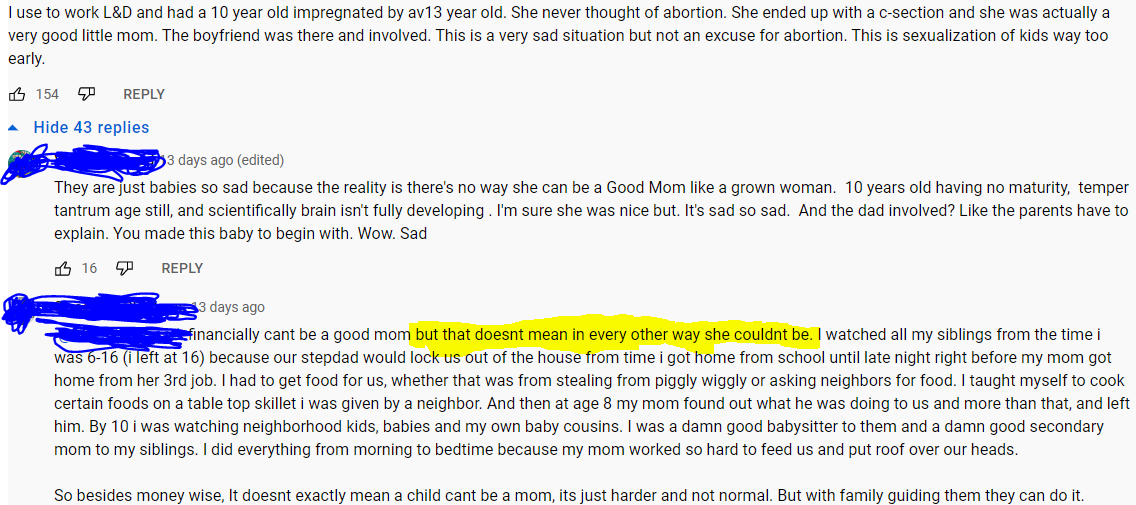Learning about the horrific, tragic story of the 10-year-old girl from my home state of Ohio has been a nightmare. On top of the pain she’s suffered, her story is now at the center of the raging debates over the aftermath of Roe v. Wade getting overturned. I think it’s reasonable to surmise that, for many, this poor girl has gone through the realization of one of the worst possible scenarios in the wake of the recent ruling.
Content/Trigger Warning: Discussion of Sexual Violence Against Children
Investigating Ohio’s Laws
This story first came out due to an article published on July 1. It shared that Dr. Caitlin Bernard, the doctor who gave the girl her abortion, opted to do it after learning about her situation from a child abuse doctor in Ohio. The girl had to travel to Indiana, Dr. Bernard’s state, for the procedure because Ohio’s anti-abortion laws don’t offer an exception for r*pe.
I wanted to confirm that this lack of an exception is the truth. Searching for the answer took me to this article, which offered a hyperlink to the text of the anti-abortion bill itself.
The article was correct. In the first few pages of the text, the bill states that besides a “medical emergency” or “medical necessity”, a lengthy process must be followed to authorize the abortion procedure. There’s no mention of r*pe constituting an exception to this process.
Snopes confirmed that the ongoing claim otherwise, that Ohio’s law provides this exception, is false. They reported that the source of this debate over Ohio’s law comes from remarks made by Ohio’s Attorney General Dave Yost on Fox News.
A.G. Yost argued that the girl didn’t have to leave Ohio because of the state’s law giving an exception, in his words, “broader than just the life of the mother.” He didn’t outright state that there’s an exception for r*pe in Ohio’s law. Instead, A.G. Yost was likely referring to the provided exception in the law for cases where abortion would prevent serious, possibly irreparable harm to a bodily function.
Dr. Caitlin Bernard
After hearing this story, Indiana’s Attorney General Todd Rokita stated that he would investigate Dr. Bernard. A.G. Rokita’s concern was over whether or not Dr. Bernard had reported the abortion within three days of the procedure, per Indiana’s abortion laws.
Recent reports show that Dr. Bernard did, in fact, follow her state’s laws. Within two days of the required three, she submitted the documents to the Department of Child Services.
Dr. Bernard is opting to sue A.G. Rokita for defamatory remarks he made against her. To summarize, A.G. Rokita accused Dr. Bernard of not being a real doctor and somebody who failed to report abortions in the past.
As reported by Newsweek, threats of kidnapping were previously made against Dr. Bernard’s daughter in response to abortion procedures she’d performed. Their article mentioned that The Guardian had previously reported about the pro-life extremist group Right to Life Michiana listing Dr. Bernard’s name on their site.
In The Guardian‘s article on this matter, published on January 14, 2022, they shared a statement from Jackie Appleman, Right to Life Michiana’s executive director, regarding the threats against Dr. Bernard and her daughter. Appleman told The Guardian that Right to Life Michiana doesn’t condone violence or harassment against anybody involved in abortion procedures.
Even then, Right to Life Michiana refused to remove Dr. Bernard’s information from their site.
Addressing Contempt Against the Case
Before the public became aware of the identity of the r*pist, a 27-year-old man named Gerson Fuentes, some prominent Republican figures refused to believe that this case was even real.
Rep. Jim Jordan said, in a tweet he later deleted, that this was “another lie”, as shared by Newsweek. They also shared that South Dakota’s Governor, Krist Noem, referred to this case as “#FakeNews from the liberal media” in a likewise deleted tweet.
Besides these politicians, other prominent speakers, such as Allie Beth Stuckey, voiced concerns over the legitimacy of this case. Before we learned the identity of the r*pist, she posted this YouTube video, sharing a Twitter thread from a journalist concerned about “red flags”:
Allie shared a concern that regardless of Ohio’s abortion law, the child could’ve received an abortion here instead of in Indiana because of the “risk of harm to bodily function” exception. On top of this, Allie repeated a widespread discontent with the news not sharing the identity of the r*pist.
Identifying the Perpetrator
On July 13, we finally learned his identity, sadly confirming the truth of this case.
After his identity was made public, subsequent questions were raised about this case. These include understandable concerns about the timeline of what happened, especially regarding delays in reporting the crime.
I found this article by Cincinnati.com, which gives a detailed breakdown of these events. Much of what they learned comes from Jeffrey Huhn, the Columbus police detective involved in this case.
Huhn first reported the crime to Franklin County Children Services on June 22. A week later, on June 29, the girl went to Indiana. Cincinnati.com‘s article explains that an Ohio doctor gave a referral to Dr. Bernard because they were concerned about their inability to perform the abortion procedure. The article notes that, unfortunately, certain factors determine whether or not the mother’s health is in danger.
From what I read, the article surmises that this Ohio doctor was concerned that there would be pushback against themselves performing the procedure for this reason.
Regarding the delay in arresting Fuentes, this article shares that the girl identified him as her r*pist on July 6. Once he was identified, the police created a warrant and arrested Fuentes on July 12. This was the day before his name was revealed to the public and media.
Fuentes confessed to the crime, revealing that he had r*ped her. This article states that the police report can’t be released until the case is fully finished.
Reactions
Some of the Christian reactions to this girl’s suffering validate the fears recently shared about placing religious values over autonomy.
While doing research for this article, I found this post by the National Catholic Register in direct response to her story. They state the Catholic church’s firm stance against all abortion and refer to her as a “young woman”, despite her being a 10-year-old child.
This ties into the argument that, when it comes to the intersection of abortion and r*pe, the child/fetus shouldn’t be punished. While this is a fair point, it’s also necessary to likewise state that it’s not the r*pe victim’s fault, either. The victim shouldn’t be forced to carry a reminder of their suffering with them against their will.
I read another pro-life article that asserted that what the 10-year-old girl needed was, besides crucial medical care, a c-section. While I understand that abortion will always be a tough topic, it still grosses me out that anybody would want a 1o-year-old girl to consider a c-section in the wake of a pregnancy forced on her instead of acknowledging the validity of her going through with an abortion.
Also, I’d like to share this screenshot I took from the comment section under Allie’s video. These comments about how a 10-year-old girl should keep it and become a young mother disturbed me.

Do we have to say the obvious, that just because a 10-year-old girl is biologically capable of being a mother doesn’t mean she should be?
If this horrific crime happened to my daughter, and somebody had the cruel audacity to tell her that she has to keep it no matter what, I’d be vengeful. Way to cut the victim out of the discussion.
Frank Turek and Charlie Kirk’s Discussion on Abortion
A while ago, I came across this video from the Christian apologetics channel Cross Examined, featuring Frank Turek (a popular apologist) and Charlie Kirk, a conservative activist:
Here’s a transcription of much of what Turek said about people expressing anger and concern about imposed religious views:
“A lot of times, and as a result of the Roe v. Wade decision, people are going to say, ‘This is not a theocracy! You can’t impose your religion on people!’
Let me point one thing out: we’re not imposing religion. We’re not legislating religion. We’re not telling people where, when, how, or if to worship. We’re not telling people they have to be part of a church or they have to believe in certain things about God. We’re not trying to legislate religion.
We are trying to legislate morality. And all laws legislate morality.
Every law declares one behavior right and the opposite behavior wrong.
In fact, the people who say they have a right to an abortion, that’s a moral position! They’re trying to put that into law, to say that a woman has an absolute right to basically kill her child!
-Frank Turek, “Charlie Kirk and Frank Turek discuss politics and morality”
Is it really true that all laws legislate morality? This article on the topic of the morality of laws reminds us that, no, not all laws are genuinely moral and good.
The author gave this quote from St. Augustine, which sums up this truth:
“It seems to me that an unjust law is no law at all.”
-St. Augustine
What justice is there in laws that force women to bear children and potentially lose their lives against their will?
The Real Fear of Forced Pregnancy
While there’s pro-life scorn against the fear of forced pregnancy, this fear has become all too real for many. There’s scientific evidence that, besides the heartwrenching testimonies out there that already prove this, being forced to go through an unwanted pregnancy has severe consequences for mental health.
On top of this, the linked article above shared data that shows that the United States has the highest rate of mortality for pregnant people out of all developed countries.
When Roe v. Wade was overturned, this heartbreaking story about a young mother in Poland resurfaced:
The young 30-year-old Polish mother, Izabela, died in a hospital after doctors refused to give her an abortion despite the clear threat to her life. Even with the exception of life-endangering circumstances for abortions in Polish law, doctors are sometimes afraid to make the wrong choice and be punished for it later.
Izabela’s story is eerily similar to the death of Savita Halappanavar, an Indian dentist who died in Ireland in 2012. Despite knowing that her pregnancy was going to fail, doctors refused to induce it because doing so was evidently considered the same as abortion. Savita died from sepsis and multiple-organ failure; the doctors waited too late to act, not until they knew the fetal heartbeat had ceased.
They blatantly disvalued Savita’s life. Despite her plea that she wasn’t Irish or Catholic and thus should’ve been given the proper treatment, they refused. All because they wanted to follow the law.
Were their deaths somehow moral in the end because the laws of these countries were obeyed?
People have ample reason to fear that the lives of mothers will be tossed aside when stories like these surface. Oh, and after reading this article by Slate about how states are handling abortion laws, I read the hyperlinked article they shared from Idaho Capital Sun that revealed Idaho’s refusal to provide an exception for life-endangering circumstances for abortion.
So much for “not imposing religion on people”.
Featured Image by Alexas_Fotos/Pixabay
Hello, and thank you for supporting my work here on Patheos! If you’d like to support me further, please feel free to “Buy Me A Coffee” here:












